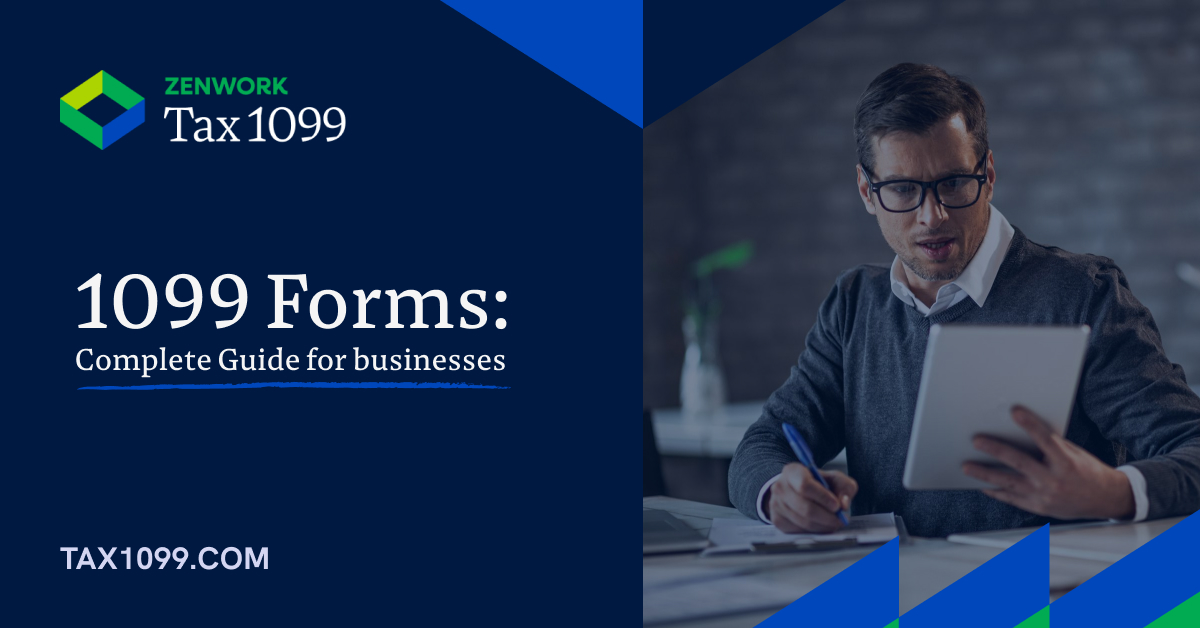1099 Forms for businesses is significant to report the payments made to employees and non-employees. Various types of 1099 Forms serve different purposes. File it by the due date to avoid penalties, and carefully submit the Form.
Overview:
As a business owner, you should be aware of tax reporting and compliance details. If you are a small business owner, master Form 1099 to comply with tax obligations and avoid penalties. In this blog post, we will break down all the intricacies, like understanding Form 1099, the types of 1099 Forms, due dates, and how to file it online without any hassle.
What is Form 1099?
Form 1099s are filed by businesses to report payments made to independent contractors, freelancers, and other non-employees. The IRS uses this information to verify whether individuals (recipients) report their tax returns accurately. This is why the 1099 Form plays a significant role in ensuring tax transparency in the business ecosystem.
Different Types of 1099 Form:
Several types of 1099 Forms are available on the IRS website, and those serve specific purposes. Some of the common 1099 forms are:
-
Form 1099-MISC:
This form reports miscellaneous income, including rent, awards, prizes, royalties, crop insurance paid to non-employees such as freelancers, contractors, and other self-employed individuals.
-
Form 1099-NEC:
This form is used to report compensation for non-employees. It reports payments of $600 or more made during the year during a trade or business to non-employees such as independent contractors, service providers, and consultants.
-
Form 1099-K:
Form 1099-K serves as a record of payments received throughout the tax year from:
- Credit, debit, or stored value cards, including gift cards (payment cards)
- Payment apps or online marketplaces facilitated through third-party payment networks. Venmo or PayPal.
It is applicable for payments exceeding $600. A credit card, debit card, or stored-value card is included in these card transactions.
-
Form 1099-DIV:
This form is filed for the distributions and dividends from stocks and mutual funds. It comprises information about any dividend from capital gains or losses and whether foreign taxes are paid in dividends. If small businesses collect income over $10, they must report it in this form.
-
Form 1099-INT:
Being a business owner, you must report Form 1099-INT for the interest income from multiple sources, like an investment account and a credit or bank account. If the amount transcends $10 for that tax year, submit this form.
-
Form 1099-R:
Reporting of this form is used for distributions from similar sources such as retirement accounts, pensions, or annuities. All recipients of a 1099-R form have to include the information reported on this form when filing their income tax return for the current year.
-
Form 1099-G:
Form 1099-G is related to reporting the payments and benefits individuals receive from the government. The recipients concerned should mention it in the form. The IRS verified the tax return accurately for tax enforcement purposes.
Due Dates of 1099 Form:
All business owners must check the deadlines for the different 1099 forms. The due date for filing paper or e-filing of Form 1099-NEC is Jan 31. However, the deadlines for paper filing and e-filing with the IRS of Form 1099-MISC are Feb 28 and Mar 31, respectively.
To check the due dates of all the 1099s: visit Form 1099 Deadlines
Form 1099 Filing Tips for Businesses:
Filing Form 1099 becomes easier when businesses follow the following practices:
Choose the Correct Form:
It’s common for employers to be unsure about which form to use when it comes to payments made to employees or non-employees. Remember that 1099-NEC belongs to non-employees, and 1099-MISC is for the compensation of employees. Also, to eliminate any confusion and ensure you’re using the correct form, consider using Tax1099’s Copilot. It’s designed to guide you in selecting the appropriate form to file based on your specific situation.
Missing Deadlines:
Be aware of the filing deadlines of different 1099 forms. You can schedule the filing in advance to avoid any delays. If you miss the deadline for reporting, penalties ranging from $60 to $310 per form for that tax year will be imposed.
Keep Records:
Maintaining copies of the 1099 Form and other supporting documents for a minimum of 3 years is essential for tax audit purposes. Platforms like Tax1099 allow you to access historical data and records for four years.
How to File 1099 Form Accurately?
You have to follow these steps when filing out the form.
- Enter the details, like the TIN number of the company, the payer’s TIN number, name, and address.
- Put the recipient’s information, such as name, address, and payee’s TIN, that you can get from Form W-9. All the information must be up to date and correct.
- Enter the correct amount you paid to the recipients and check again to avoid any discrepancies.
- Review the form and click the submit button.
Why Tax1099’s A Perfect Choice for eFiling:
Diverse features of Tax1099 help businesses experience hassle-free filing.
- TIN matching: Tax1099 enables you to validate your vendor/payee TIN in real-time with the IRS’ TIN matching service within a few seconds. It helps you fill out the form accurately and avoid penalties.
- Bulk filing: Tax1099 allows you to file several forms in one go with bulk filing feature to save your time.
- Security is the most important thing in filing, and the 256-bit bank-grade encryption of Tax1099 ensures that safety.
- Scheduled eFiling feature confirms that you don’t miss the due date for filing the form. The process is automated to avoid errors like human entry.



